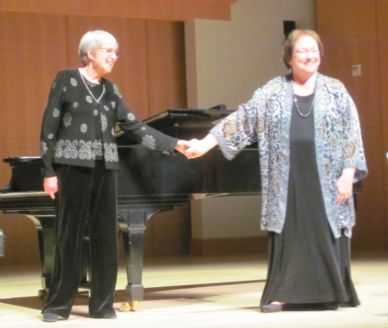|
Symphony
FROM THE NEW WORLD TO THE OLD WORLD
by Peter Lert
Saturday, June 14, 2025
Chamber
MC2 DUO RECITAL CLOSES 222'S SEASON
by Terry McNeill
Saturday, June 14, 2025
Choral and Vocal
CANTIAMO SONOMA'S LUSCIOUS A CAPELLA SINGING IN SEASON ENDING CONCERT
by Pamela Hicks Gailey
Sunday, June 8, 2025
Symphony
SRS SEASON ENDS WITH RESOUNDING TA-TA-TA-BANG
by Terry McNeill
Sunday, June 1, 2025
Symphony
YOUTHFUL VIRTUOSITY ON DISPLAY AT USO'S MAY CONCERTS
by Peter Lert
Saturday, May 17, 2025
Symphony
MYSTICAL PLANETS AND LIVELY GERSHWIN ORTIZ AT FINAL SRS CONCERT
by Peter Lert
Sunday, May 4, 2025
Symphony
VSO'S CONCERT MUSIC OF TIME, MUSIC OF PLACE
by Peter Lert
Sunday, April 27, 2025
VOCAL ELEGANCE AND FIRE AT THE 222'S RECITAL APRIL 26
by Pamela Hicks Gailey
Saturday, April 26, 2025
CANTIAMO SONOMA SINGS AN INSPIRED GOOD FRIDAY MOZART REQUIEM CONCERT
by Pamela Hicks Gailey
Friday, April 18, 2025
DRAMATIC SHOSTAKOVICH SYMPHONY CLOSES PHILHARMONIC'S 25TH SEASON
by Terry McNeill
Sunday, April 13, 2025
|
 |
 Marilyn Thompson (l) and Carol Menke Feb. 23 in Schroeder Hall |
24 SONGS IN A MENKE-THOMPSON RECITAL ODYSSEY
by Terry McNeill
Saturday, February 23, 2019
Sonoma County pop and country singing enjoys continued popularity but it rare to see a professional classical vocal concert announced. Diva Ruth Ann Swenson was once a local star, but she has long departed and not much virtuoso recital singing can be found in the North Bay. But the exception to this bleak landscape is the wonderful Carol Menke, and with pianist Marilyn Thompson the soprano gave a splendid recital Feb. 23 in Schroeder Hall.
Ms. Menke, constantly active with performing, teaching and multiple chorus direction, offered a tour of 24 art songs in four languages, beginning with three songs on the text “Weep You No More” by Dowland, Quilter and Robert Sheldon. All were charmingly sung, especially the pensive and eerie Dowland. Floated and rhapsodic top notes characterized the Quilter, and Ms. Thompson’s rippling arpeggios the Sheldon version. The audience clapped between each, an irritating intrusion that would last the entire recital.
Preceding three Schumann songs the soprano offered comments on the afternoon’s composers in her usual charming and self-effacing way, and the initial Schumann song (“Die Blume der Ergebung”) was immediately was familiar aural territory. It was a richly colored song, as was the warmth and yearning of “Meine Rose” with Ms. Menke’s fluent modulations and Ms. Thompson’s lovely postlude. The more familiar “Lied der Suleika” completed the set with the singer choosing a judicious tempo and conveying veiled happiness.
Ms. Menke is a consummate Fauré interpreter, and “En Sourdine,” Op. 58, the “Vocalise” from 1906, and the early “La Rose” (1890) displayed her mastery. The singing of each was focused, rhapsodic and sensual, with often the piano parts proving that the composer was “old arpeggio.” The “Vocalise” was sung with wordless melismatic E Minor leaps and filigree, and the final song, a tribute to a rose, had more bass sound the piano and for a moment covered the vocal line. That’s not usual for Ms. Menke’s singing, as her voice can tend to be powerfully operatic in art song, especially with Schroeder Hall’s acoustics and today being only a third full. Diva Margaret Price’s lieder singing made the same effect on me, too potent for the humble song.
San Francisco composer Robert Sheldon’s four songs closed the first half, and the duo has recorded several of them. Ms. Thompson, a friend of the composer that died in 1995, cordially mentioned several aspects of Sheldon’s life, and proceeded with Ms. Menke to perform “Memory, Hither Come,” “Cool Is the Valley Now,” “Marsh Cry” and “My Woman Says.” The musical atmosphere was sharply different from the beguiling French diction of Fauré, and the highlight was the dark “Marsh Cry.” Here the voice and piano were often far apart, the harmonies intriguing and Ms. Menke’s voice and interpretation bordered on shrillness. Singing in the finale was bright and gay, briskly moving along and shedding some of the previous melancholy.
Acoustical clarity was improved by moving close to the stage for the second half, that began with Turina’s Poeme Forma de Canciones,” Op. 19, and the piano solo of the initial “Dedicatoria” was omitted. The singer only sporadically looked at the score in this impressionistic music that first sounded uniquely Spanish in the swirling “Cantares” with its up and down jumps and high forte ending note. The bucolic “Los Dos Miedos” had a shimmering and complicated sound, with hints of Granados and even Chopin. The up-tempo “Las Locas Por Amor” had an optimistic contrast of voice and piano lines, reminiscent of Chabrier, and an exalted character.
Four of Copland’s “Twelve Poems of Emily Dickinson” were each individual and in ways inspiring, as the great poet’s creations were. “Nature, My Gentlest Mother” was sung with the character of the composer’s folk themes of the 1930s and 40s, with a strong chest voice and a call and response with the piano. “The World Feels Dusty” ended in mysterious shades of gray, and Ms. Menke played off the quiet dissonances in the slow “Heart, We Will Forget Him.” Exquisite singing was heard in the “Why Do They Shut Me Out of Heaven,” the poem unfolding with surprises and a long top note at the end. Applause was fulsome.
Powerful singing came in the closing three Strauss works, and Ms. Menke remarked that she had known the pensive “Morgen” (Op. 27, No. 4) since youth but this was her first public performance of the 1894 composition. The long piano prelude led to a glorious and autumnal ambiance, nothing rushed. In the “Wiegenlied” the singer’s control of small changes in volume was flawless and also operatic, and the closing popular “Ständchen” (Serenade, Op. 17) had all the probity of the Dickinson songs with much more warmth and passion.
No encore was offered.
|

